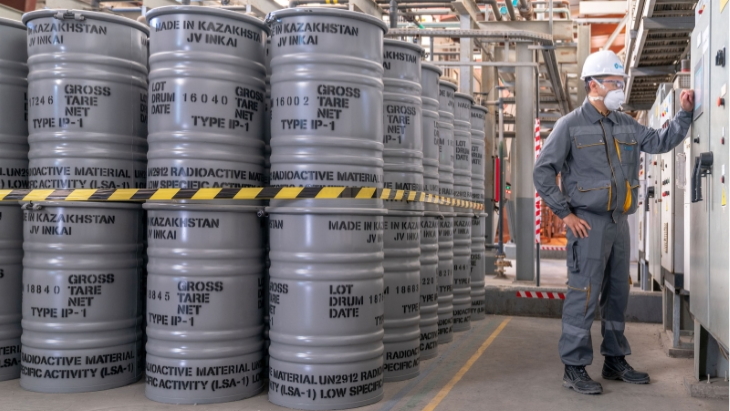The geopolitical weight of Astana's uranium
Kazakhstan is the world's largest supplier with 40% of world production. Historically, Russia has always been the main outlet for this raw material, but today demand is growing from China and also the West. Making Central Asia a key region for the balance of tomorrow's world.
Astana (AsiaNews) - The demand for Kazakhstan's uranium is raising tensions in Eurasia, not least because of the consequences of the conflict in Ukraine and the sanctions against Russia, which - as many local and international agencies point out - is increasingly in conflict with China over this precious material.
Some Russian political scientists agree that 'Moscow and Beijing are divided by Kazakhstan, on the banks of the Embe River', the territory of uranium mining.
Kazakhstan is the world's largest supplier of uranium, with 40 per cent of the world's production, the bulk of which used to go to Russia. Now among the buyers are the US and China, creating very strong geopolitical competition worldwide. Astana cannot in fact increase exports in one direction without reducing them in the other in a short time, and some recent decisions by the Kazakh government have further exacerbated the tension.
First of all, the main uranium mine in Budenovsk recently came under the control of Russia's Rosatom, Moscow's nuclear energy agency. On the other side, Astana agreed to sell 30 tonnes of fuel to Beijing for China's nuclear power plants, a deal that will allow the Chinese to transform combustion plants into nuclear power plants by mid-2030. For this, Kazakhstan pledged to increase uranium production by 50%.
A direct confrontation is thus looming between Moscow and Beijing, which is not limited to uranium, but includes various aspects. In fact, China has many interests in Central Asia, not only related to infrastructure to complete the trade corridor to Europe.
In addition to uranium, it is interested in regional exports of its products, Central Asian water resources, and other valuable minerals in the area. According to experts, Russia should be more concerned about China's mercantile activism in Central Asia, rather than its bypass routes to western markets.
All this increases the importance of the role that Central Asia, starting with Kazakhstan, can play in the coming years, as a result of the great changes taking place, thanks precisely to the wealth of its natural resources, which had made Russia's fortune in the first Putin decade.
Not only the great powers and neighbouring countries, but also much more distant parts of the world are increasingly looking in this direction, which until now had always been rather ignored.
In the economic and political disputes, of course, the position regarding the ongoing war plays a great deal, not only on the part of the leaders, but also of the populations. In Kazakhstan, even more so than in the other countries of the region, the tendencies to get rid of Soviet-era Russian influence are strengthening, not least because of the concerns of the northern regions that Russia considers 'naturally Russian territories'.
The political ideal of a 'new Kazakh nation', which President Kasym-Žomart Tokaev tries to interpret, pushes towards an increasingly negative assessment of the Kremlin's initiatives, especially the military ones.
On the other hand, the Kazakh nationalists also criticise the 'too rigid' stance of the Ukrainians, who should take an example from the 'multi-vector' and multi-cultural line of Astana, to defend all ethnic minorities, historically suffocated by Russian-Soviet imperialism.
This is why their independence and territorial integrity must certainly be defended, but without a spirit of revenge and mutual destruction. Kazakhstan is a candidate to "represent the place of mediation between East and West", as the Kazakh political scientist Akhas Tažutov observes, pointing precisely to the Embe river, and the uranium lands, as the true "corridor of universal peace" for the years to come.
26/01/2009







.png)










